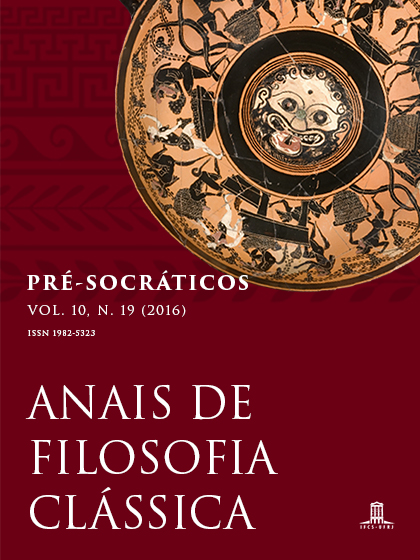The philosopher, his predecessors, the commentator and his critics: on the criticism of Harold Cherniss's critique of Aristotle as a source for early Greek philosophy
DOI :
https://doi.org/10.47661/afcl.v10i19.3764Mots-clés :
Aristotle, Presocratic, doxography, Harold ChernissRésumé
When studying the early Greek philosophers, it is usually not enough to recur solely to fragments. Testimonies are useful and sometimes key in order to reconstitute their doctrines. However, dealing with testimonies — and our major source of testimonies is Aristotle and the peripatetic tradition — may be tricky. Harold Cherniss's Aristotle's criticism of presocratic philosophy (1935) was a major milestone in the study of Aristotle's transmission of the doctrines of his Preplatonic predecessors. Cherniss's critics, however, have been hard over his reading of Aristotle. If Aristotle distorts presocratic doctrines intentionally, as Cherniss's critics charge him of accusing Aristotle, then it would be too risky to use Aristotle as a source. If he intentionally distorts his predecessors, we should expect him to do everything he can to hide all traces of it. However, if he is sincere, the so-called distortions may seem so because he cannot avoid seeing his predecessors through his own lenses. In this paper, I analyze three paradigmatic types of criticism raised against Cherniss: the one that aims to safeguard Aristotle's reliability as a source for early Greek philosophy, the one intended to safeguard his right to the title of historian, and another one that rejects both discussions as shadowing Aristotle's philosophical activity. Even if some of Cherniss's conclusions about the doctrines of the early Greek philosophers may seem outdated, his general method stands valid: Aristotle's testimony should be approached in a careful and systematic way in order to remove his misinterpretations and eventual distortions. The three types of criticism analyzed, however, do not seem to touch the kernel of this method. On the contrary, they seem to agree with the basic premises, but somehow insist that Cherniss's criticism is out of place.
Téléchargements
Références
AUBENQUE, P. L'histoire de la philosophie est-elle ou non philosophique? Oui et non. In: CASSIN, B. Nos Grecs et leurs modernes: Les stratégies contemporaines d'appropriation de l'antiquité. Paris: Éditions du Seuil, 1992. p. 17-36.
BRUNSCHWIG, J. L'histoire de la philosophie est-elle ou non philosophique? Non et oui. In: CASSIN, B. Nos Grecs et leurs modernes. Les stratégies contemporaines d'appropriation de l'antiquité. Paris: Éditions du Seuil, 1992. p. 37-96.
CHERNISS, H. F. Aristotle's Criticism of Presocratic Philosophy. Baltimore: John Hopkins Press, 1935.
CHERNISS, H. F. The Characteristics and Effects of Presocratic Philosophy. In: TARÁN, L. Selected Papers of Harold F. Cherniss. Leiden: E. J. Brill, 1977 (1st pub. 1951). p. 62-88.
COLLOBERT, C. Aristotle's Review of the Presocratics: Is Aristotle Finally a Historian of Philosophy? Journal of the History of Philosophy, Baltimore, v. 40, n. 3, Jul. 2002. 281-295.
DIELS, H. Die Fragmente der Vorsokratiker. 6th ed., rev. by Walther Kranz. ed. Berlin: Weidmann, 1952 (1st ed. 1903).
FREDE, M. Aristotle's Account of the Origins of Philosophy. Rhizai. A Journal for Ancient Philosophy and Science, n. 1, 2004. p. 9-44.
GADAMER, H.-G. The Beginning of Philosophy. Tradução de Rod Coltman. New York: Continuum, 2001.
GUTHRIE, W. K. C. Aristotle as a Historian of Philosophy: Some Preliminaries. The Journal of Hellenic Studies, London, v. 77, n. 1, 1957. p. 35-41.
KIRK, G. S.; RAVEN, J. E. The Presocratic Philosophers: A critical history with a selection of texts. Cambridge: Cambridge University Press, 1957.
LESZL, W. I Primi Atomisti: Raccolta dei testi che riguardano Leucippo e Democrito. Firenze: Leo S. Olschki, 2009.
LONG, C. P. Saving ta legomena: Aristotle and the History of Philosophy. The Review of Metaphysics, Washington, v. 60, Dec. 2006. 247-267.
MANSFELD, J. Sources. In: LONG, A. A. The Cambridge Companion to Early Greek Philosophy. Cambridge: Cambridge University Press, 1999. Cap. 2, p. 22-44.
MAQUEO, D. E. T. Aristóteles: ¿historiador de la filosofía? Tópicos, México, n. 14, p. 83-103, 1998.
MCDIARMID, J. B. Theophrastus on the Presocratic Causes. Harvard Studies in Classical Philology, Cambridge, v. 61, 1953. 85-156.
NIGHTINGALE, A. W. Spectacles of Truth in Classical Greek Philosophy. New York: Cambridge University Press, 2004.
POWELL, C. T. Why Aristotle has no Philosophy of History. History of Philosophy Quarterly, v. 4, n. 3, Plato and Aristotle Issue, p. 343-357, Jul. 1987.
RUNIA, D. T. The Sources for Presocratic Philosophy. In: CURD, P.; GRAHAM, D. W. The Oxford Handbook of Presocratic Philosophy. Oxford: Oxford University Press, 2009. Cap. 2, p. 1-48 (e-book by Oxford Handbooks Online).
STEVENSON, J. G. Aristotle as historian of philosophy. The Journal of Hellenic Studies, London, v. 94, Nov 1974. 138-143.
TAYLOR, C. C. W. The Atomists: Leucippus and Democritus. Toronto: University of Toronto Press, 1999.


